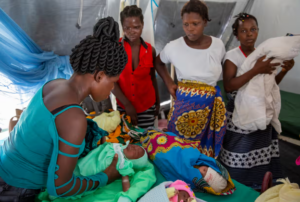The Climate Crisis Is Not Gender Neutral, UN Says
Originally published by Sarah Johnson for the Guardian
Only a third of countries include sexual and reproductive health in their national plans to tackle the climate crisis, the UN has warned.
Of the 119 countries that have published plans, only 38 include access to contraception, maternal and newborn health services and just 15 make any reference to violence against women, according to a report published by the UN Population Fund (UNFPA) and Queen Mary University of London on Tuesday.
The report is the first to examine whether climate plans refer to sexual and reproductive health.
It calls on more countries to recognise the disproportionate impact of the climate crisis on women and girls, and for more action.
Rising temperatures have been linked to poorer maternal health and complications during pregnancy, such as gestational diabetes. Extreme heat has been associated with triggering earlier deliveries and an increase in stillbirths.
The report said the climate crisis exacerbated existing inequalities. In east and southern Africa, for example, tropical cyclones have damaged health facilities, disrupting access to maternal health services and helping spread waterborne diseases such as cholera.
Hurricanes and droughts increase the risks of gender-based violence and child marriage, it added, as families under stress are less able to support daughters and seek to marry them off.
Angela Baschieri, an adviser on population and development for UNFPA and one of the report’s authors, said: “If we look at the plan of action for women and girls, national plans show there is more work that could be done.
“We know climate change disproportionately affects women and is not gender neutral so there is a need to address those gaps and impacts.”
